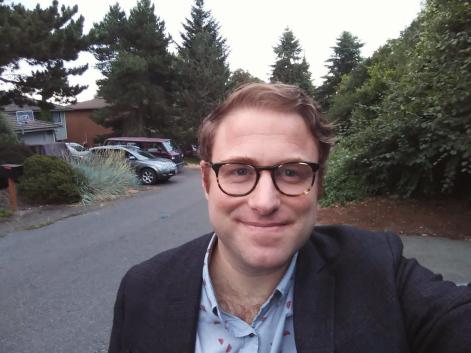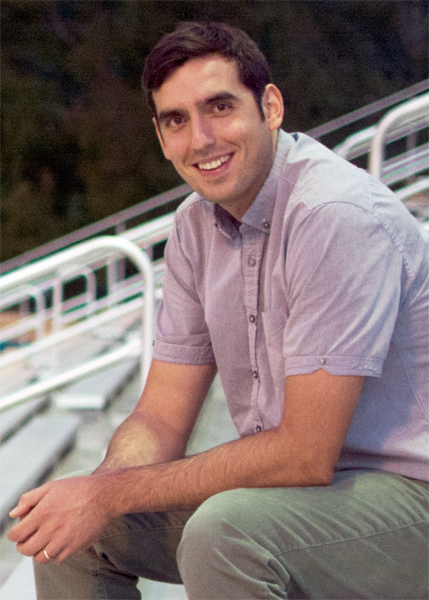The morning after Steve Lando discovered he was going to be a father, he and Teddy Nguyen drove Highway 2 through Gold Bar and Index up to Steven’s Pass to go snowboarding. The weather was dry until they hit Skykomish, when sleet started to fall, which slowly turned into a thick wet snow as they made their way further up the mountain.
Teddy rolled down his window to flick ash from a cigarette. The truck tires spun for a quick moment on the snow before catching. They were halfway through listening to Van Halen’s “Running with the Devil” when Teddy turned down the music and screamed. Teddy could do a good David Lee Roth animal howl, though there were very few people who could appreciate it.
Teddy turned down the music. “Lando, you’re bumming me out. I can feel your vibes. They’re gross.” He changed lanes to pass a Suburban that was going twenty through the packed snow.
“Relax,” said Steve. He turned the music back up. He worried about what a person should listen to around a child and at what volume. He didn’t know what one did with a child. He’d never even held one.
“Get it together, motherfucker,” yelled Teddy over the music. “Today we ride. Park and pow!” He slapped the wheel with his palm.
Steve hadn’t mentioned the pregnancy to Teddy, or anyone else. When his girlfriend Mona had told him the news, they’d stayed up late talking. The only way he could describe the conversation was that it felt like a phone interview, with all the silent pauses, the awkwardness. It was tough to put to words feelings you didn’t recognize. He’d managed it by being polite and asking questions, and letting Mona do most the talking, which she’d seemed grateful to do, or at least willing. After he left her apartment, all he could think to do was lift weights, so he went to 24 Hour Fitness and worked out until he could barely move.
They parked along the side of the road a quarter mile away and slowly trudged toward the slopes in their boots, snow piled up high and dirty beside the road. They planned to meet up with their friend Barney, who taught lessons in the morning and worked the afternoon shift at the Jupiter Express chairlift, which ran up nearly fifteen hundred vertical feet in four minutes. After spending most of the morning in the backcountry on the far side of the mountain, they found Barney at the chairlift and got in line.
The lift attendant wore a beard tied into braids and was eating popcorn from a bag. Steve could smell the butter, which reminded him of movie nights when he was a child. He wondered how old a child had to be to watch movies.
It was their turn to get on the lift. The three of them hustled up to the red line and waited for the chair to swoop around and pick them up. A single got in next to them to fill out the fourth seat, a boy in skis and a parka that had a patch of the Nordic cross on the breast. Steve wondered how old he was but didn’t ask, because when he was a kid he’d always wished he was older, and admitting his actual age was always a letdown.
They all sat down and the chair rushed them up the mountain, lifting them through the tree line. Out past the lifts was a steep face covered in the scattered lumps and depressions of a mogul run. To the sides were evergreen trees laced with snow. Steve watched two skiers traverse the cat trails snaking between the trees. How long before you could teach a kid to snowboard?
“The air up here is like a drug,” said Teddy.
“I took Sudafed last night,” said the boy. “I had a cold but now it’s gone.”
“Well here’s something for you,” said Teddy. “Hockey players used to take handfuls of Sudafed before games, to give them energy. That’s because the same drugs that are in Sudafed are also in meth. Do you know what meth is?”
“Let’s not talk about meth,” said Steve.
“They keep the meth Sudafed behind the counter now,” said Barney, pulling one of his gloves tight. “They have to see your I.D. if you want to buy it. And they’ll only sell you that one package.”
“I play hockey,” said the boy.
“I almost forgot,” said Teddy. He took off his glove and dug around in his pocket. He handed what looked like tightly-wrapped candies to each of them, including the boy. “Mentholatum cough drops,” he said. The boy looked nervous. “They’re fine. They’re cough drops. Suck on them for a few seconds then open your mouth to the cold. It’ll feel like ice fairies are dancing inside.”
Steve removed his gloves and slid them into his pockets and unwrapped the lozenge. It was marbled white, slightly translucent, like the ice covering the lake of the winter cabin he’d visit once a year with his family, the lake he’d learned to skate on, and then hockey, with Teddy. He popped the lozenge into his mouth and sucked. He opened his mouth and felt the sharp cold. But there was also a warmth in his stomach and neck: this would be a trick a father would show a child.

Ross McMeekin’s stories have appeared in Virginia Quarterly Review, Redivider, Tin House Flash Fiction Fridays, and X-R-A-Y. His debut novel, The Hummingbirds (Skyhorse), came out in 2018.



